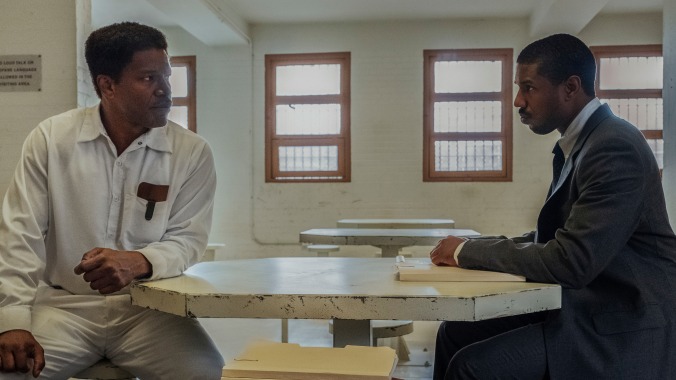Destin Daniel Cretton’s film Short Term 12 (2013) has rightly appeared on some recent best of the decade lists, but beyond its overall artistic merit, it’s arguably more well-known for the strength of its young cast, stacked with then-small-name actors like Brie Larson, Lakeith Stanfield, Rami Malek, Kaitlyn Dever, Stephanie Beatriz, and John Gallagher Jr. There’s less of a sense of discovery in Cretton’s new film, the death-penalty drama Just Mercy. Larson, now a superhero and Oscar-winner, returns in a supporting role, with Michael B. Jordan and Jamie Foxx as leads, and Tim Blake Nelson and O’Shea Jackson Jr. filling out some character parts. But Cretton doesn’t let this considerable star power overwhelm the movie, or turn it into awards-season showboating. He’s still working through an immensely talented cast with his signature sensitivity.
Just Mercy is based on the memoir of the same name by Bryan Stevenson, played here by Jordan. Fresh from Harvard Law and an internship in Georgia, he moves to Alabama in the late ’80s, intent on opening a practice to help prisoners appeal death row sentences. One of his earliest cases involves Walter McMillian (Jamie Foxx), who is “apprehended” in the film’s opening scene, and railroaded for the murder of a young white woman with frightening speed and efficiency. (Amazingly, he is housed on death row before his trial even begins.) By the time he meets Bryan, Walter has given up much hope that a lawyer will be able to help.
The movie doesn’t juice this hopelessness with murder-mystery ambiguity, making clear that the challenge of the case is systemic; Bryan barely has to dig before he finds alibis aplenty and a total lack of physical evidence against Walter. In Monroeville, Alabama, his client is simply “guilty from birth,” as Walter describes it. Cretton builds the social context clearly and carefully, taking note of everyone who asks new-in-town Bryan whether he’s yet seen the “Mockingbird Museum,” dedicated to the setting of author Harper Lee’s most famous work, as if this ameliorates the racism right in front of him.
Cretton relies on his actors to bring subtlety and nuance to a story that is, in its broadest outlines, clear-cut. Once locals understand that Bryan intends to help death row prisoners, many of them treat him with hostility: In one scene, a guard insists on strip-searching him during a routine prison visit. Bryan knows both that it isn’t right and that he must submit in order to help his client, his emotions playing out almost entirely on Jordan’s face, fear and anger registering more vividly than grandstanding dialogue.
Foxx does powerful work in an even quieter register, playing up his resignation as well as his weary friendships with fellow inmates Herbert (Rob Morgan) and Anthony (O’Shea Jackson Jr.). It would be easy enough for the movie to present some kind of moral contrast between the nonviolent, low-key Walter and prisoners who have admitted to actual wrongdoing, but all of the men are given dimension. Cretton shoots their inter-cell conversations simply but strikingly, using their prison whites and white-painted bars to form negative space around the men’s faces. In one wrenching mid-movie sequence, only tangentially related to Walter’s case in terms of plot, he captures the ceremonial barbarism of capital punishment—how unnatural it is for a prisoner, guilty or not, to see his death coming from days, weeks, or months away.
These character-driven sidebars are welcome in part because there isn’t a whole lot of fresh legal procedural going on in Just Mercy, beyond some tense scenes between Bryan and a pivotally fuzzy “witness” played by the scenery-chewing Tim Blake Nelson. Otherwise, the case against Walter is so self-evidently thin that characters are forced to convey some of its information several times, and some of the plot depends on bringing his plight to the attention of 60 Minutes. (Turns out, the airing of a TV segment is not especially cinematic.) Larson, as Bryan’s intrepid paralegal, is stuck with more obligatory material, in a part that feels more like a favor for frequent collaborator Cretton than a real acting challenge. This is very much the type of prestige picture that a talented indie director obligingly makes for a big studio. But in this case, it was a savvy hire: The filmmakers and actors imbue the characters with remarkable depth of feeling.








































